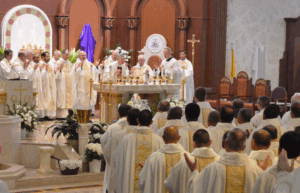Holy Orders
The Sacrament of Holy Orders
In a complementary manner, the Sacrament of Holy Orders and the Sacrament of Marriage are considered together by our church as the two sacraments of vocation and commitment. This is because they both involve a call and response, a permanent commitment and unique graces appropriate for each way of life. The Sacrament of Holy Orders, in addition, imparts a special “character”, or permanent spiritual mark upon the soul of the ordained that orients and supports the ordained in their ministries, They are “set apart and consecrated for sacred duties” and responsibilities within the larger community of all the baptized who constitute a Priestly People. From apostolic times, the Church has recognized three separate “orders” : Episcopal (Bishop), Priestly and Deacon. Each of these Sacred Orders has its own proper responsibilities and ordination rites. Both the ministry of the priest and the ministry of the deacon may, in addition, be understood as a part of the fullness of the identity and ministry of the Bishop.
The different roles and responsibilities of Bishop, presbyter (priest) and deacon evolved gradually in the apostolic church and can be found already present in Acts of the Apostles and in the Pastoral Letters of Peter and James. Bishop, priest and deacon embody the life and ministry of Jesus and His values and priorities. Promises of celibacy, obedience and prayer became codified and were over time incorporated into the ordination rituals and the vocational expectations. Announcing of the “Good News”, celebrating the sacraments, the teaching of the apostolic faith and traditions, pastoral leadership and pastoral care are all charisms and responsibilities that flow from Holy Orders. In each diocese throughout the world, there exists this complementarity of episcopal, priestly and deacon ministries. This “hierarchical structure” of the church must always be understood as existing within and emerging from the “priesthood of the baptized”. It is the People of God that forms, supports and ratifies the vocational call to ordained ministry. Any form of “lording it over them” or abuse of power clearly has no justification in the teaching and example of Jesus “who came to serve and not to be served”. The exercise of authority in the church always has the teaching of Jesus’ Holy Thursday Washing of the Feet as its paradigm and model. The instruction given by the Bishop to deacons at their ordination captures powerfully this ideal: “Believe what you read, Teach what you believe and Practice what you teach”.
Another way of expressing the ministry of Holy Orders is to see the bishop, priest and deacon as assisting the whole community of the baptized, the “ecclesia” in our living out of our core identity as church: to live the Word, to Worship, to Witness and to Serve others in the name of Christ. We are called to be a “Priestly People” and from within the life of the church, bishops priests and deacons receive important responsibilities of leadership, worship, service and example. These have existed from apostolic times and can be summarized as: evangelization, forming and building up of the Christian community, creating and supporting diverse ministries, presiding at the Eucharist and embodying the teachings of Jesus.
Some of the characteristics of the living out of Holy Orders have evolved and changed throughout the history of the Church. Its essence, however, its vision and purpose has remained unchanged —- to lead, serve, teach, sanctify and to embody the life, death and resurrection of the Lord. The “Good News” that gives us all life and hope. As a fellow pilgrim on the Way of Jesus, the ordained bishop, priest and deacon travels sometimes ahead, sometimes in the middle and sometiemes behind the People of God but always intimately connected with the Body of Christ in all of its fullness. We all grow in holiness and grace ” in, with and through our Risen Lord, the “Eternal High Priest” as we worship the Father in the unity of the Holy Spirit.
We need to continue to pray for, assist and encourage those who are discerning God’s call to priesthood and religious life. Ordained ministry, Holy Orders is a fulfilling, challenging and significant path and vocation in our church’s life and one that needs our love and support now more than ever.
As mentors and inspiration for the ordained ministry, we can think of none more powerful than Saint John Vianney and Saint Vincent De Paul. As the patron saints of our two Florida seminaries, they model humility and compassion for all those who would seek to serve the Lord in ordained ministry.

